The Best Motorcycle Oil to Keep Your Bike Running Smoothly

Your motorcycle deserves it
Evans: Writing about oil is like discussing politics, guns, abortion, and religion all rolled into one. You’re sure to offend a few people, from the “any oil is fine as long as it’s changed regularly” set to the “I only use the most expensive stuff on the planet” types. Then the interval will raise hackles, too. I wish you luck, Ryan.
Great, I thought to myself after being sent the assignment. There are a few ways to approach this topic. I could try and defend marketing claims from major corporations about how great their oil is or, I could give some basic information about what makes motorcycle oil different and what certifications to look for – which you’ll find after the product recommendations – and also a few options our staff has used or knows to be of good quality. But first an explanation…
Which one is “best”?
Oh boy. Without a comprehensive and scientific evaluation of all of the motorcycle-specific oils on the market including a detailed description of what “the best” means to ensure we’re talking objectively, I can’t really say. That’s not what we’re trying to do with this article. Like motorcycles these days, there are so many good oils on the market, you’d be hard-pressed to go wrong with any of them. Routine maintenance, following your manufacturer’s recommendations, and a little bit of scrutiny to make it past the marketing hype will go a long way toward ensuring that your motorcycle’s engine remains healthy and happy.
That being said, there are other variables to consider. The weather where you ride, the type of motorcycle you’re riding, whether you’re riding a competition-only off-highway (street or dirt), among others. For my personal motorcycles, I use the manufacturers’ recommendations all the way down to the brand in my road bikes (even though I know it isn’t necessary). My dirtbikes get their oil changed much more often and I use Shell Rotella because it’s cheap and meets JASO MA2 specs. Things like price, availability, and personal preference have a lot to do with purchasing decisions, too. Oil grades (weights), as well as PAOs, Ester-based, and petroleum-based oils, are other variables and a conversation for another time. The information below should be enough to ensure you pick the right kind of oil to keep your motorcycle performing as it should.
Included here are known brands that our staff has used, currently uses, or believes to make great products. We may be missing some, but this is a sampling to get you started.
Table of Contents
-
1. Wallet-friendly option: Shell Rotella: Shop Now
-
2. KTM's suggestion: Motorex Formula 4T: Shop Now
-
3. Bel-Ray EXP Synthetic Ester Blend 4T Engine Oil: Shop Now
-
4. Castrol Power 1: Shop Now
-
5. Liqui Moly 4T Conventional Street Oil: Shop Now
-
6. Lucas High Performance Synthetic Engine Oil: Shop Now
-
7. Manufacturer’s brand: Shop Now
-
8. Maxima Premium: Shop Now
-
9. Motul 300V: Shop Now
Wallet-friendly option: Shell Rotella
Shell Rotella T4 Triple Protection 15W-40 is designed to provide hardworking protection that adapts to your driving conditions. With millions of miles of real world testing, Shell Rotella T4 Triple Protection 15W-40 uses a proprietary formula exclusive to Shell. It is designed to protect under the most severe engine conditions found in modern low-emission engines and older hard working diesel engines.
Certifications
- JASO MA/MA2
KTM's suggestion: Motorex Formula 4T
Motorex Formula 4T is a modern semi-synthetic engine oil for 4-stroke motorcycles. Reliable lubrication, thermal stability and extends engine life. KTM has had a partnership with Motorex for some time now which should say something about the performance of Motorex oil, not to mention the company has been around for over 100 years.
Certifications
- API SL
- JASO MA
Bel-Ray EXP Synthetic Ester Blend 4T Engine Oil
Bel-Ray has a large swath of powersports lubricants in its line-up including on-road, off-road, PWC, and UTV/ATV applications. The EXP Synthetic Ester Blend 4T engine oil combines synthetic oils with select mineral base oils ensuring the highest level of protection and is suitable for air-cooled/liquid-cooled 4-stroke engines and wet clutches. Bel-Ray proudly manufactures all of its products in the United States.
Certifications
- API SN
- JASO MA2
Castrol Power 1
Castrol Power 1 is a fully-synthetic motorcycle oil. The addition of Castrol TRIZONE Technology is said to deliver uncompromised performance protection by providing protection to the three critical zones of engine, clutch, and gears in your bike. Triumph motorcycles having a partnership with Castrol should also lend ease of mind to those using Castrol motorcycle oils.
Certifications
- API SN
- JASO MA2
Liqui Moly 4T Conventional Street Oil
Liqui Moly 4T Conventional Street Oil is a heavy-duty mineral oil formulated for air and water-cooled 4-stroke engines. Designed to deliver reliable lubrication, optimum noise damping and good wear resistance even under extreme conditions. Suitable for engines with or without a wet clutch.
Certifications
- API SN Plus
- JASO MA2
Lucas High Performance Synthetic Engine Oil
Lucas Synthetic Engine Oil is a high performance blend of quality, full synthetic base stocks and proprietary Lucas-brand additives. This winning combination is engineered to keep rotating engine parts clean and lubricated while extending engine life and maximizing engine performance. Designed for wet clutch applications.
Certifications
- API SM
- JASO MA
Manufacturer’s brand
Of course, you can’t go wrong using the manufacturers branded oil. Pro Honda, Kawasaki Performance, and Yamalube are just a few names to mention, but you can ensure these oils will be a-okay for your machine.
Maxima Premium
Founded in 1979 and headquartered in southern California, Maxima provides a substantial lineup of oils. From V-Twin to racing, both on-road and off, Maxima has the oil you need.
Mineral based 4-stroke engine oil designed to ensure optimum protection, peak performance and positive clutch feel. Provides excellent film thickness and viscosity stability across all operating temperatures. Advanced, proprietary additive system keeps your engine running clean, trouble-free and extends the life of the machine.
Certifications
- API SL
- JASO MA2
Motul 300V
Fully synthetic 4-Stroke motorcycle racing engine oil developed for Factory Teams. The 300V Factory Line lubricant takes advantage of the ESTER Core Technology to ensure maximum power output of the engine without compromising reliability and wear. Motul selects esters over other high performance synthetic base stocks and combines them with an innovative additive package to create a perfect synergy dedicated to the engine, gearbox and clutch.
Certifications
- JASO MA2
What makes motorcycle oil motorcycle oil
While any oil is better than no oil, there are properties that make certain oils better for motorcycles. The American Petroleum Institute (API) impacts the consumer market through the development and licensing of engine oil industry standards. The API, among other duties, works with automotive manufacturers to ensure oils perform at optimal levels for the requirements needed for vehicles to run as efficiently as possible. You may have seen the API logo on the back of certain oils, while some simply state that they meet API standards. Without the logo, the oil manufacturer is claiming they meet the standards, but have not paid licensing fees to the API.
Motorcycles differ from automobiles in many obvious ways. One of those is how their engines use oil. A four-stroke motorcycle engine uses a combined oil system throughout the motor, gearbox, and clutch whereas in an automobile, (or two-stroke motorcycle) the engine oil is separate from the transmission oil. Friction modifiers and additives that may allow oil to perform better in automotive applications would actually be at the detriment of motorcycle engine wear and clutch performance. This led to the creation of motorcycle-specific JASO certifications.
JASO
JASO (Japanese Automotive Standards Organization) – the Japanese equivalent to the API – set out to develop its own standards specifically for motorcycles. The goal was to ensure oil properties and additives were acceptable for the unique environment found in motorcycle engines. In 1998, JASO T903 was introduced as the globally accepted standard for four-stroke motorcycle engines. Furthermore, JASO T903 is now broken down into four categories: MA, MA1 MA2, and MB.
- JASO MA: This standard specification is for oils that are used within one oil system (where the engine, gearbox and clutch use the same oil). These oils don’t contain any friction modifiers.
- JASO MA1: Is a lower standard specification for motorcycles that require different oils for the engine, gearbox and clutch.
- JASO MA2: Is a higher standard specification for modern motorcycles. These oils are suitable for use in motorcycles that have catalytic converters in the exhaust system.
- JASO MB: This is a lower standard specification for scooter engines, which has additional friction modifiers for lower friction to increase fuel economy.
Like API mentioned above, JASO has a specific stamp of approval. If this stamp is not found and the JASO specification is only mentioned, the manufacturer is claiming its oil has been tested to pass the specification, but the company has not licensed the test from JASO itself.
How often should I change the oil in my motorcycle?
However often your manufacturer suggests!
How do I check the oil in my motorcycle?
Most motorcycles have either a sight glass which you can see the oil level through while the bike is upright to determine levels and/or a dipstick similar to what is used in most four-wheeled contraptions, albeit much shorter.
Recent Updates: August 2022: Updated text, images, and order.February, 2021: FAQs, Updates, and Additional Resources added.
Additional Resources
We are committed to finding, researching, and recommending the best products. We earn commissions from purchases you make using the retail links in our product reviews. Learn more about how this works.
Become a Motorcycle.com insider. Get the latest motorcycle news first by subscribing to our newsletter here.

Ryan’s time in the motorcycle industry has revolved around sales and marketing prior to landing a gig at Motorcycle.com. An avid motorcyclist, interested in all shapes, sizes, and colors of motorized two-wheeled vehicles, Ryan brings a young, passionate enthusiasm to the digital pages of MO.
More by Ryan Adams



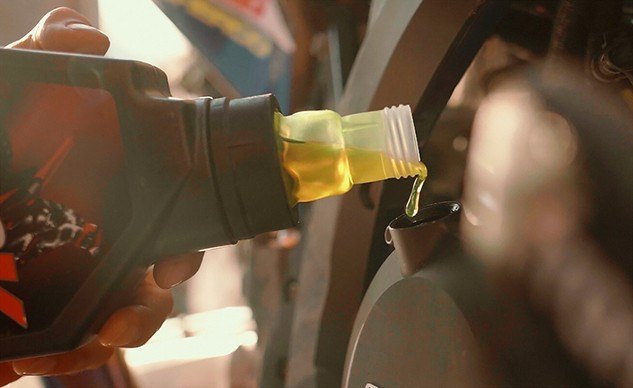
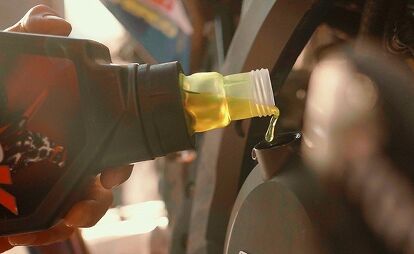













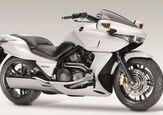

















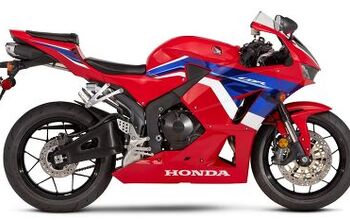
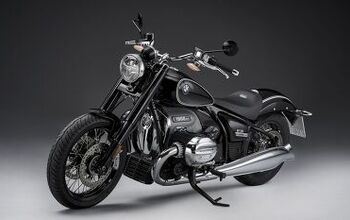



Comments
Join the conversation
I Use amsoil 10w50 twin motorcycle oil,I just had a ServiceMaster done on my 2008 KTM 990 Superduke and had 10w60 motorex put In this time. I use mutol 300v In my 2004 BMW k1200rs. I swear by all 3 oils pay me now or pay me later is always in my mind for the expensive price the oils are but engines are way more expensive to replace and I don't use Fram filters ,Keith
There is only 1. The first. The history. Etc.
What a dumb article! It looks like you just reprinted the marketing drivel from the manufacturers. None of this tells me what "the best" oil for my bike is. How about references to some actual testing of the products. It's out there!